Spotlight
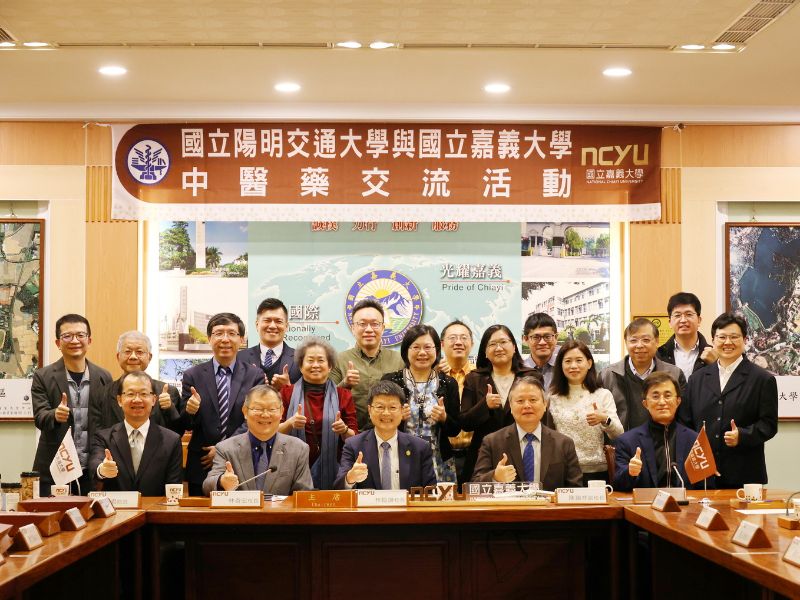
NCYU and NYCU Join Forces to Advance Chinese Herbal Medicine, Forging a New Paradigm for Modern Chinese Medicine
In response to the government’s national vision of building Taiwan into a science and technology hub for Chinese herbal medicine, President Chi-Hung Lin of National Yang Ming Chiao Tung University (NYCU) led a seven-member delegation, including Shuu-Jiun Wang, Dean of the College of Medicine, to National Chiayi University (NCYU) on January 26 for an academic exchange in traditional Chinese medicine. Through in-depth dialogue and the sharing of research outcomes, the two universities integrated NYCU’s strengths in smart healthcare and clinical evidence with NCYU’s extensive expertise in medicinal plant cultivation and agri-food innovation. Together, they are building a comprehensive value chain for Taiwan’s Chinese herbal medicine industry, from germplasm conservation and smart cultivation to clinical application. Under the leadership of President Han-Chien Lin and the long-term dedication of its Chinese herbal medicine research team, NCYU has received support from the Ministry of Education’s Higher Education Sprout Project and the Ministry of Health and Welfare’s medicinal plant cultivation program. These efforts have generated breakthroughs in research and application of native medicinal plants. Faculty from the College of Life Sciences and the College of Agriculture formed an interdisciplinary team that introduced Internet of Things (IoT) and sensing technologies to develop smart cultivation models for medicinal herbs such as mint, Houttuynia cordata, Artemisia capillaris, and Agrimonia pilosa. The approach effectively stabilizes the quality of their active compounds. The team has also established germplasm conservation systems for rare medicinal plants, including Taiwan pepper and Atractylodes macrocephala. These research outcomes have been successfully brought to market as anti-fatigue turmeric kombucha and a range of traditional herbal tea bags, underscoring a strong capacity to commercialize academic research. NYCU’s School of Chinese Medicine began recruiting students in academic year 2024–2025, making it the first national university in Taiwan to establish a Chinese medicine department. NYCU President Chi-Hung Lin noted that the key to “new Chinese medicine” lies in integrating modern technologies – molecular medicine, neuroscience, and artificial intelligence – to build scientific, evidence-based clinical validation for traditional medical practice. He emphasized that high-quality, traceable, and standardized sources of Chinese medicinal materials are indispensable for clinical research and new drug development. NCYU President Han-Chien Lin stated that amid the rapid growth of the global natural health industry and international competition under the WTO framework, Taiwan’s Chinese herbal medicine sector stands at a critical juncture for transformation and upgrading. Through this partnership, the two universities are advancing a strategic alliance on “medicine–agriculture integration.” NCYU will take charge of upstream efforts, including superior cultivar selection based on Good Agricultural Practices (GAP) and standardized smart cultivation, to ensure the quality and safety of Chinese medicinal materials. NYCU will focus on downstream efforts such as pharmacological mechanism analysis, clinical trials, and smart healthcare applications. Together, they will build an industry collaboration model that seamlessly links upstream and downstream efforts. This cooperation is expected to gradually address Taiwan’s long-standing structural reliance on imported medicinal materials while cultivating cross-disciplinary talent in Chinese medicine with strengths in cultivation, pharmacology, and clinical application. From the fertile lands of the Chianan Plain to consultation rooms in medical centers, NYCU and NCYU will work together to sharpen Taiwan’s “new Chinese medicine” brand, injecting strong momentum into national health and biotechnology industry advancement. Photo 1: NYCU President Chi-Hung Lin led a delegation from the College of Medicine to NCYU for an academic exchange in traditional Chinese medicine. Photo 2: The NYCU College of Medicine delegation visited NCYU to view the native medicinal plant Artemisia capillaris. Photo 3: The NYCU College of Medicine delegation toured NCYU’s Chinese herbal medicine extraction facility. Photo 4: NCYU President Han-Chien Lin (second from left), NYCU President Chi-Hung Lin (center), and team members from both universities posed for a group photo.
2026.02.11
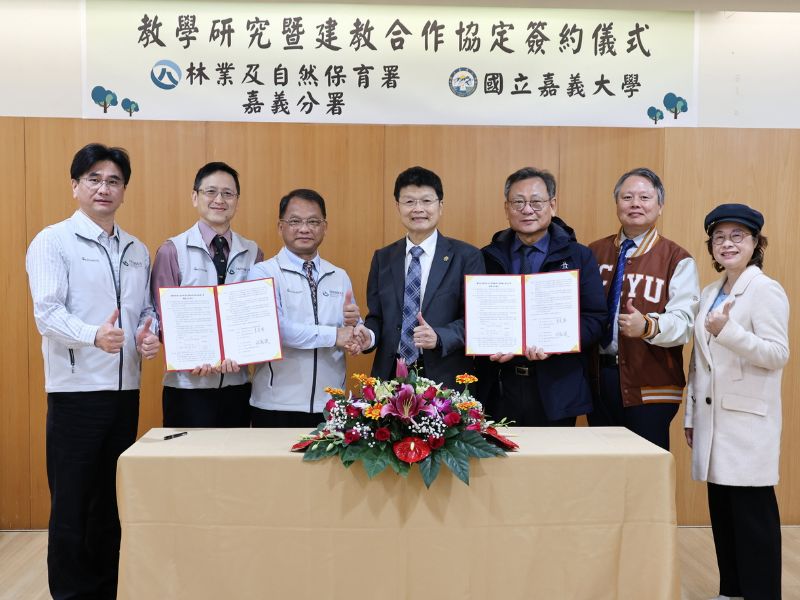
NCYU Joins Forces with FANCA’s Chiayi Branch to Sign a Teaching and Research Cooperation Plan and an Industry–Academia Cooperation Agreement, Setting a New Benchmark for Forest Sustainability and Talent Development
On January 2, National Chiayi University (NCYU) signed a Teaching and Research Cooperation Plan and an Industry–Academia Cooperation Agreement with the Chiayi Branch of the Forestry and Nature Conservation Agency (FANCA), Ministry of Agriculture. The initiative will advance teaching and research on forest management, ecological conservation, and sustainable development. By integrating academic inquiry with real-world field settings, it aims to cultivate future professionals with strong expertise and a deep sense of public responsibility. In his remarks, NCYU President Han-Chien Lin expressed sincere appreciation to the Chiayi Branch of FANCA for its long-standing support of higher education and academic research, as well as its dedicated stewardship and investment in the sustainable management of Taiwan’s forest resources. The signing marks a deeper partnership between the two institutions and demonstrates joint action by government and academia in responding to climate change and environmental challenges. Lee Ting-chung, Director of the Chiayi Branch of FANCA, noted that the industry–academia cooperation agreement with NCYU marks a major milestone in advancing the sustainable management of national forests and strengthening government–academia cooperation. By providing representative state-owned forest lands as teaching and research sites, the initiative will deepen research on forest resource management and ecological conservation. It will also help cultivate forest professionals with both hands-on and academic expertise, laying a stronger foundation for future forest governance and nature conservation. The initiative encompasses key mountain forest areas, including the Alishan and Dapu Working Circles, as well as NCYU’s Shuisheliao Learning, Research, and Education Center, covering approximately 15,600 hectares in total. These experimental forest sites are critical frontlines for forest resource management, ecological conservation, water resource protection, and climate adaptation. Going forward, NCYU and the Chiayi Branch of FANCA will jointly plan and establish teaching and research experimental forest areas. With years of frontline experience in forest governance, the Chiayi Branch has accumulated extensive practical expertise. Its science-based, sustainability-oriented governance philosophy aligns closely with NCYU’s academic development in agriculture and forestry, ecology, environmental studies, and disaster prevention, providing a strong foundation for cooperation. President Lin noted that teaching, research, and real-world field settings will be tightly integrated through this initiative. Students will be able to step beyond the classroom and into the forest, apply what they learn in practical contexts, strengthen hands-on professional skills, and develop a deeper understanding and a stronger sense of responsibility regarding public issues and sustainable development. It will also support government agencies by providing scientific evidence and innovative solutions in areas such as forest management, nature conservation, ecological monitoring, and climate change adaptation. In 2025, NCYU received approval from the Ministry of Education to establish the Master’s Program in Chinese and Western Medical Sciences. Through close collaboration with the Chiayi Branch and leveraging NCYU’s research foundation in agricultural sciences and medicinal plant cultivation, the initiative will establish a network of low-, mid-, and high-altitude research sites to support the cultivation and R&D of medicinal plants. By translating academic strengths into tangible contributions to local development and public policy, these efforts will help fulfill the university’s social responsibility. President Lin emphasized that joint efforts by higher education institutions and government agencies are essential to address the challenges posed by climate change and rapid ecological shifts. With the Chiayi Branch committed to safeguarding national lands and NCYU dedicated to talent cultivation and social engagement, the two institutions will move forward hand in hand, creating lasting and meaningful social value for Taiwan’s forest sustainability, ecological conservation, and professional talent development. Photo 1: NCYU and the Chiayi Branch of FANCA signed a teaching, research, and industry–academia cooperation agreement. Photo 2: NCYU President Han-Chien Lin and Lee Ting-chung, Director of the Chiayi Branch of FANCA, posed for a photo following the signing ceremony. Photo 3: Faculty members of NCYU and staff of the Chiayi Branch of FANCA posed for a group photo.
2026.02.09
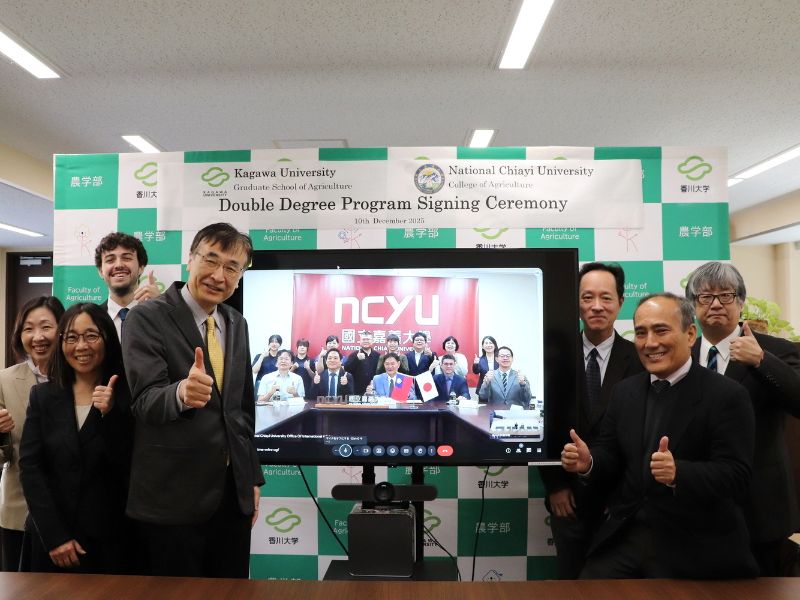
NCYU and Kagawa University Advance Taiwan–Japan Agricultural Higher Education Partnership through a Cross-Border Double-Degree Framework
On December 10, 2025, the College of Agriculture at National Chiayi University (NCYU) and the Faculty of Agriculture at Kagawa University held a signing ceremony for the “Master’s Double-Degree Cooperation Agreement,” marking a significant milestone that further deepens and expands their international partnership in higher education. Since becoming sister institutions in 2013, NCYU and Kagawa University have continuously strengthened exchanges in student exchange programs, short-term courses, academic research, and tripartite forums, gradually building a solid network for cross-border educational collaboration. In recognition of the strong traditions and remarkable research achievements of the College of Agriculture at NCYU and the Faculty of Agriculture at Kagawa University in agricultural sciences, the College of Agriculture at NCYU proactively proposed a master’s double-degree initiative in 2024. After nearly two years of reciprocal visits, bilateral consultations, and administrative coordination, NCYU President Han-Chien Lin and Kagawa University President Natsuo Ueda jointly signed a university-level cooperation framework on November 19, 2025. The agreement laid the formal groundwork for the official launch of the college-level double-degree program. The signing ceremony was conducted via video conference, during which Prof. Masahiro Ogawa, Dean of the Faculty of Agriculture at Kagawa University, noted that deep mutual ties have been fostered between the two institutions through long-standing exchanges. The launch of the double-degree program marks a major milestone that will enhance students’ intercultural competence as well as their international mobility and professional competitiveness. Prof. Shen Rong-Show, Dean of the College of Agriculture at NCYU, noted that amid rapid global changes, international partnerships and cultural exchanges among universities are central to addressing emerging challenges, and expressed hope that the double-degree program will open broader international academic horizons for students from both institutions. One of the key advocates of this initiative, Prof. Peter Lutes of Kagawa University’s Faculty of Agriculture, personally led two students interested in applying for the double-degree program to Taiwan to attend the ceremony, and voiced his expectation of seeing more students from both institutions pursue cross-border studies in the future. Cheng-Cheng Yang, Dean of the Office of International Affairs at NCYU, stated that since the sister-university agreement was established, NCYU has recommended approximately 20 students for exchange study at Kagawa University. He added that the launch of the double-degree program further demonstrates NCYU’s tangible progress in advancing its “One Department, One College, One Internationalization” initiative. Under the double-degree framework, students from both institutions are expected to share deeper international learning resources, further strengthening youth exchange and cooperation between Taiwan and Japan. Photo 1: The College of Agriculture at NCYU and the Faculty of Agriculture at Kagawa University held a video conference signing ceremony for the double-degree cooperation agreement on December 10. Photo 2: Prof. Masahiro Ogawa (center), Dean of the Faculty of Agriculture at Kagawa University, signs the double-degree cooperation agreement on behalf of the college. Photo 3: Group photo of NCYU representatives and the visiting delegation from Kagawa University’s Faculty of Agriculture (Photo courtesy of the Office of International Affairs) Photo 4: Group photo of faculty members from the Faculty of Agriculture at Kagawa University and the College of Agriculture at NCYU attending the signing ceremony.
2026.01.13
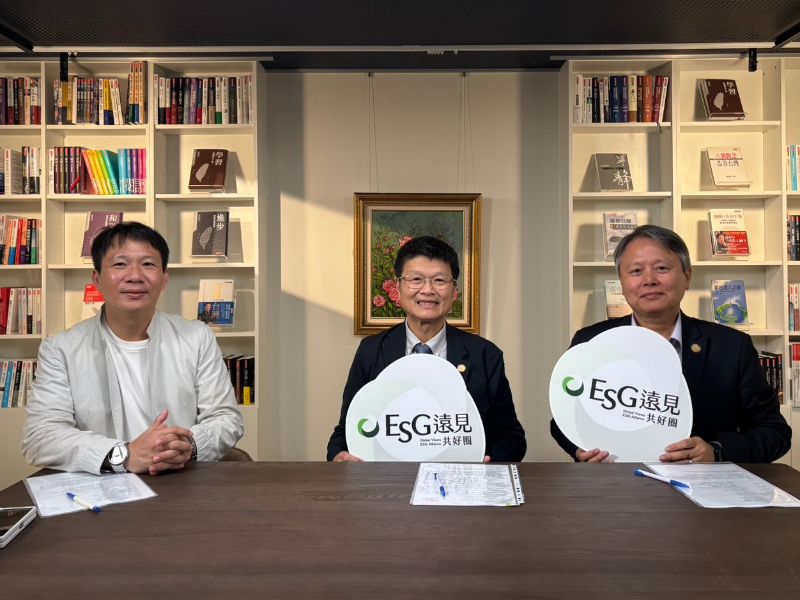
NCYU Unveils Achievements in Sustainable Campus Development and Interdisciplinary Innovation
National Chiayi University (NCYU) President Han-Chien Lin and Vice President Ruey-Shyang Chen recently participated in the recording of the “Global Views On Air” podcast, where they shared how NCYU has adopted the philosophy of “Virtuous Educators and Abundant Harvests” as the core of its governance. Spanning smart agriculture, circular economy, energy conservation, carbon reduction, and community co-prosperity, the discussion highlighted NCYU’s sustainability blueprint and implementation efforts, underscoring its long-term commitment to sustainable development across education, agriculture, technology, and regional engagement. Building a Sustainability Governance DNA Rooted in “Virtuous Educators and Abundant Harvests” President Han-Chien Lin noted that NCYU, marking the 25th anniversary of its consolidation, has established a solid foundation in both teacher education and agricultural research. More than a comprehensive university with a strong teacher-training tradition, NCYU builds on its strengths in agriculture and life sciences, integrating expertise in engineering and management to develop a sustainable strategy spanning campuses, mountain regions, coastal areas, and rural communities. From rural education and local agroforestry partnerships to marine aquaculture, NCYU provides cross-disciplinary support, demonstrating the public mission and social responsibility of a regionally rooted university. From Field to Table: Smart Agriculture × AI × Biofertilizers NCYU has long pioneered smart agriculture, drawing on AI, the Internet of Things (IoT), sensors, and drone technologies to assist farmers with soil monitoring, precision fertilization, early warning of pests and diseases, and yield forecasting. The goal is to shift farming from experience-based practices to data-driven, technology-enabled approaches that boost productivity and resilience. NCYU has received multiple awards for its research and development of biofertilizers. It has successfully integrated the research capabilities of the College of Agriculture and the College of Life Sciences into agricultural practice, enabling farmers to adopt more sustainable and efficient cultivation methods. From Agricultural Extraction to Green Manufacturing: Building Sustainable Industrial Chains Building on agricultural products and Chinese herbal medicines, NCYU has developed precision and green extraction systems that transform agricultural residues into high value-added products, including foods, health supplements, medical applications, and daily-use goods. This approach not only strengthens the “field-to-table” connection, but also transforms agricultural waste into reusable and recyclable resources. Vice President Chen noted that the circular economy has become a globally recognized approach. Drawing on its strengths in agriculture, NCYU has taken on the task of advancing the reuse of post-production residues, enabling resources to be used beyond a single cycle and to generate greater added value. Campus Energy Efficiency, Net-Zero Transition, and Local Governance: Comprehensive Sustainability Actions Underway NCYU connects factories, small-scale farmers, and processors across Chiayi, Yunlin, and Tainan through IoT-enabled platforms, establishing an integrated chain spanning farming, processing, product development, and marketing. This initiative supports local industrial upgrading while assisting enterprises with ESG implementation and carbon accounting. NCYU is also moving forward with plans to establish its eighth college, the College of Medicine, with a strong emphasis on traditional Chinese medicine, to build an integrated healthcare and wellness system that encompasses medical care and health promotion. In sustainability governance, NCYU has implemented a range of energy-saving and net-zero measures, including energy-efficiency retrofits of aging buildings, the deployment of smart energy management systems, and the establishment of green hydrogen demonstration stations. These actions have successfully increased energy self-sufficiency from 9% to 25%, showcasing tangible progress in the campus’s net-zero transition. Meanwhile, NCYU has long engaged with local communities by promoting environmental education, regional revitalization, and ecological conservation, working with residents to co-create sustainable living spaces in line with its commitment to university social responsibility. NCYU will continue to integrate internal and external resources and further strengthen efforts in smart agriculture, circular economy, and net-zero action, supporting sustainable development in the Yunlin–Chiayi–Tainan region and across Taiwan’s higher education sector. Photo 1: Group photo of Bright Lee (left), Editor-in-Chief of Global Views Monthly; Han-Chien Lin (center), President of NCYU; and Ruey-Shyang Chen (right), Vice President of NCYU. (Photo courtesy of Global Views ESG Alliance) Photo 2: NCYU was featured on Global Views On Air, offering a comprehensive overview of its achievements in sustainable campus development and cross-disciplinary innovation. (Photo courtesy of Global Views ESG Alliance)
2026.01.12
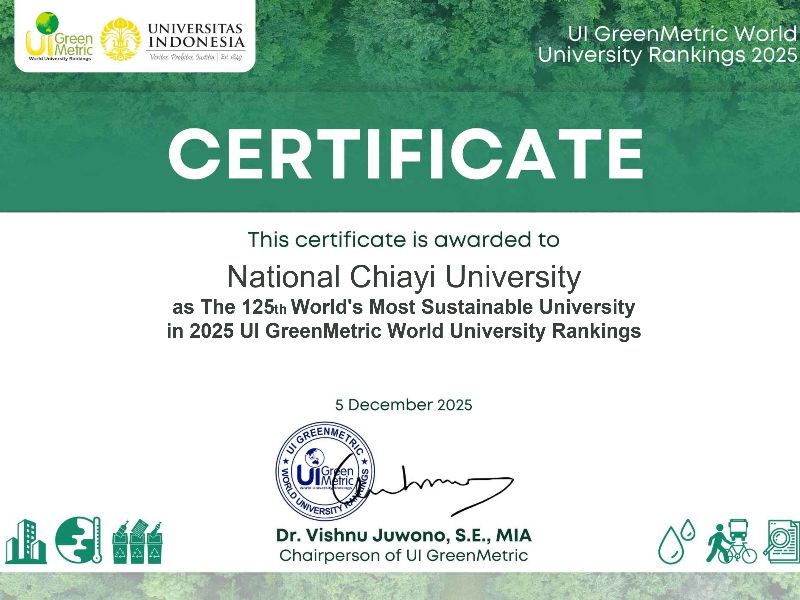
Sustainability Governance at the Core: NCYU Steadily Climbs to No. 125 in the UI GreenMetric World University Rankings
In the 2025 UI GreenMetric World University Rankings, National Chiayi University (NCYU) ranked No. 125 worldwide, rising from No. 187 in 2024. The achievement underscores NCYU’s continued international recognition for its overall performance in sustainable campus governance, environmental management, and sustainability education. The UI GreenMetric ranking, hosted by Universitas Indonesia, is one of the world’s largest sustainability assessments for university campuses. According to the official UI GreenMetric 2025 Fact File, this year’s assessment involved 1,745 universities from 105 countries. The evaluation framework covers six categories: Setting & Infrastructure, Energy & Climate Change, Water, Waste, Transportation, and Education & Research. It emphasizes the consistency and verifiability of institutional frameworks, on-the-ground actions, and supporting documentation. NCYU earned a total score of 8,462.5 out of 10,000, achieving an overall performance of 84.63%. Scores by category are as follows: Setting & Infrastructure: 1,275 / 1,500 Water: 937.5 / 1,000 Energy & Climate Change: 1,550 / 2,100 Transportation: 1,625 / 1,800 Waste: 1,550 / 1,800 Education & Research: 1,525 / 1,800 With university governance as its longstanding core, NCYU has integrated resources across the Center for Environmental Protection and Safety Management, the Office of University Social Responsibility Project, and various colleges to advance sustainability initiatives simultaneously at the institutional, operational, and educational levels. Through data-driven management and regular reviews, NCYU continues to strengthen campus energy management, water recycling and reuse, waste reduction, and the capacity of sustainability-related courses and research. This significant improvement in the ranking demonstrates not only NCYU’s accumulated achievements in building a sustainable campus, but also its tangible contributions to global climate action and the Sustainable Development Goals (SDGs). Looking ahead, NCYU will continue to deepen its sustainability governance framework, strengthen cross-unit collaboration and data quality management, and steadily advance its campus net-zero transition, moving toward a more resilient and responsible sustainable university. Photo 1: NCYU climbed to No. 125 worldwide in the 2025 UI GreenMetric World University Rankings. Photo 2: NCYU’s UI GreenMetric ranking has improved significantly year by year.
2026.01.08
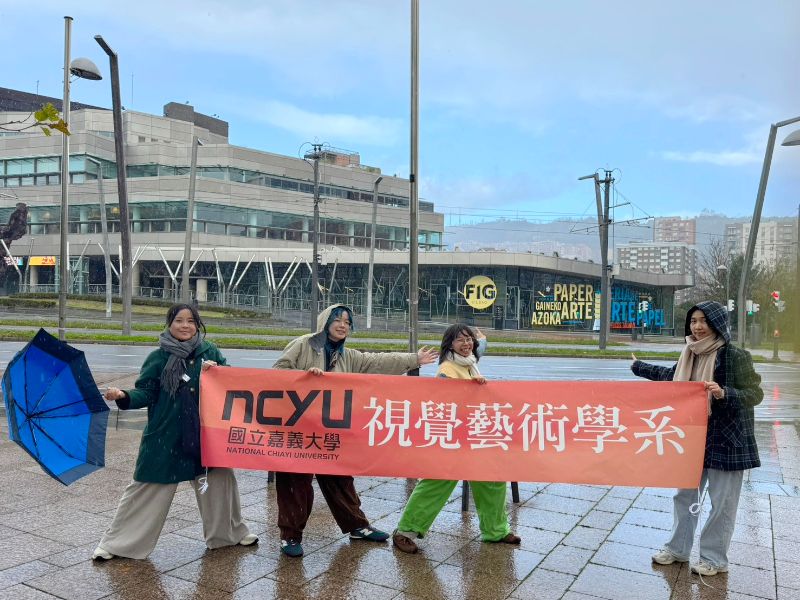
Transcending Language and Culture: NCYU Team Invited to FIG Bilbao to Showcase Taiwanese Printmaking on the Global Stage
One of Spain’s premier printmaking events, the International Printmaking and Paper Art Festival (FIG Bilbao), was held from November 27 to 30 at the Palacio Euskalduna Bilbao. This year’s festival spotlighted creative energy from Asia, inviting several Taiwanese artists to participate. Among them, the team from the Department of Visual Arts, National Chiayi University (NCYU) stood out prominently. The team, comprising Prof. Hsieh Chi-Chang, Assistant Prof. Chang Chingyu, and four emerging alumni – Lin Ting-Hsun, Chen Hsin, Chu Fang-Ying, and Yu Chih-Yu – presented in one of the festival’s flagship programs, "The Cubes of Temptations." Through cross-cultural dialogue with young artists from Spain’s Basque region, along with exhibitions, sharing of techniques, and interactive sessions, they jointly explored new possibilities for extending printmaking within contemporary art. During their studies, the four alumni honed their skills in printmaking, paper-based media, and interdisciplinary creation, building a robust artistic vocabulary. Standing on the international stage, these young Taiwanese artists, fluent in English and confident in their artistic vision, clearly conveyed their creative concepts to a professional audience, showcasing their professionalism and maturity. Assistant Prof. Chang Chingyu expressed gratitude to the National Culture and Arts Foundation for its support, which enabled emerging creators to engage internationally and communicate with audiences from diverse cultural backgrounds, thereby enhancing the visibility of Taiwanese printmaking within the global art network. During the exhibition, international audiences highly praised the works of these young Taiwanese artists, recognizing their nuanced cultural expression and keen observational insight. These qualities reveal the depth of Taiwan’s local culture, as well as its strong potential to engage with the global art scene. The artists also engaged in exchanges with students in the Basque region, sharing their creative journeys, approaches to paper as a medium, and the layered vocabulary of printmaking, highlighting the new generation’s agility in cross-cultural understanding and international artistic discourse. Alumna Chen Hsin achieved double honors at this exhibition, receiving both the Emerging Artist Grant and a two-month residency scholarship at the International Center for Contemporary Printmaking in Betanzos, Galicia, Spain. Her achievements exemplify the Department of Visual Arts at NCYU and its long-standing commitment to creative practice, technical refinement, and international mobility. They also bear witness to how Taiwan’s artistic vitality continues to shine on the global stage. Photo 1: Faculty and students from NCYU’s Department of Visual Arts at FIG Bilbao, highlighting the international visibility of Taiwanese printmaking. Photo 2: Artwork by Chen Hsin, alumna of the Department of Visual Arts, NCYU. Photo 3: Group photo of NCYU faculty and alumni in front of the Guggenheim Museum Bilbao (from left to right: Assistant Prof. Chang Chingyu, alumni Lin Ting-Hsun, Chen Hsin, Chu Fang-Ying, and Yu Chih-Yu).
2025.12.16